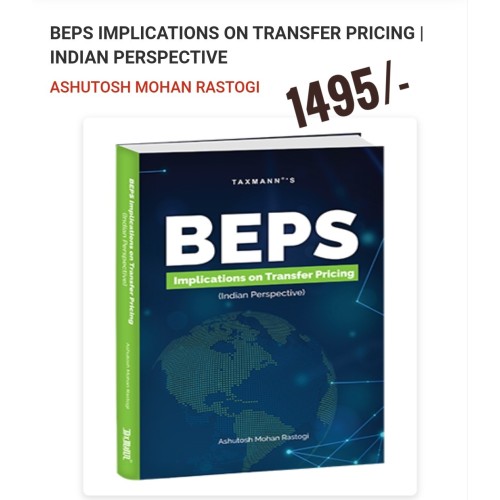BEPS IMPLICATIONS ON TRANFER PRICING -INDIAN PERSPECTIVE BY TAXMANN- ASHUTOSH MOHAN RASTOGI
Description
This book offers a comprehensive and practical guide to understanding the intricate transfer pricing implications stemming from the Base Erosion and Profit Shifting (BEPS) project within the Indian context. This work culminates two years of extensive research and analysis by a team of transfer pricing experts. The book covers a wide range of topics, starting with an overview of the BEPS project and its objectives. It also includes an analysis of international rulings on BEPS, examining landmark cases and their implications for the transfer pricing landscape.
This comprehensive guide is invaluable for tax practitioners, professionals, academics, and business leaders aiming to understand the impact of BEPS recommendations on transfer pricing in India. It facilitates informed discussions on this critical area of taxation and its implications for businesses operating in India.
The Present Publication is the Latest Edition, authored by Ashutosh Mohan Rastogi, with the following noteworthy features:
- [Realignment of Transfer Pricing Norms] The book explains why BEPS realigned 'Transfer Pricing' norms, illustrated through case studies of Google, Starbucks, and Apple, highlighting their implications on BEPS
- [Understanding and Application of BEPS Action Plans] BEPS Action plans have transformed how Transfer Pricing concepts are understood and applied, shifting focus from titles and contracts to functions and risks. This book helps readers understand these nuances in the post-BEPS era
- [BEPS Insights on Indian Law] Each chapter provides BEPS insights on Indian Law, discussing BEPS Action plans with reference to Indian Regulations, Circulars, and Case Law and explaining the relevance and implications of BEPS Action points in the Indian context
- [Planning for Intangibles in the Post-BEPS World] The book decodes how to attribute profits to intangibles in the BEPS era, explains 'Development, Enhancement, Maintenance, Protection and Exploitation' (DEMPE) functions, and assesses the relevance of holding companies in low-tax havens today
- [Economic Ownership] Readers will learn about the importance of Economic Ownership and how it is determined, exploring how Indian law attributes intangible returns based on legal or economic ownership
- [Substance in Transfer Pricing]








